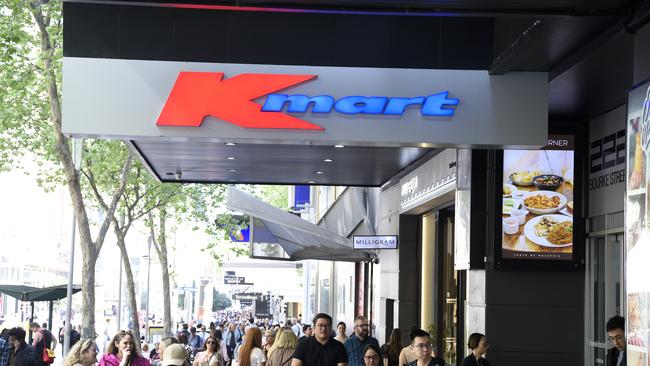Wesfarmers CEO Rob Scott warns against tax on unrealised gains in superannuation
Wesfarmers chief Rob Scott says taxing unrealised gains on superannuation balances over $3m could set a precedent that is deleterious to the national interest.

The Albanese government’s proposed tax on unrealised gains in superannuation accounts sets a bad precedent says Wesfarmers chief executive Rob Scott, who joined business leaders and economists resisting Labor’s tax grab.
The boss of the Perth-based conglomerate whose $94bn portfolio straddles retail, healthcare, chemicals, industrial services and resources added there were much more pressing tax reforms needed in the national interest including real action on productivity, the reduction of red-tape and an easing of regulations to fire up the Australian economy.
Speaking to analysts and investors at the Wesfarmers strategy day in Sydney on Thursday, Mr Scott and the chiefs of his key divisions laid out their growth aspirations.
While there was capacity for Wesfarmers to add to its portfolio, Mr Scott said the company had high return hurdles to clear such a large acquisition, and identified better value from reinvesting in its existing businesses like Bunnings, Officeworks, Kmart and chemicals.
“I think it’s more likely than not that we won’t make another big investment in these five years,” Mr Scott told The Australian on the sidelines of the strategy day.
“It would be more the exception than the rule. The main reason for that is that when I go back to what our objective is, and our objective is to deliver a top quartile total shareholder return over the long term, I’m quite confident that our current portfolio can deliver on that if we execute well.
“So I’m only going to do an acquisition if I feel it would give us some benefit over and above that.”
Mr Scott was flanked by his key executives, including new Kmart Group boss Aleks Spaseska who is a 17-year Wesfarmers veteran and who pledged to double the retail division over the next five to 10 years targeting younger shoppers with a strong focus on value and the launch soon of a new Kmart marketplace.
Bunnings boss Mike Schneider, whose hardware juggernaut still accounts for just under 60 per cent of Wesfarmers’s total earnings, confirmed the retailer’s addressable market was as high as $110bn as it pursued new categories to bolt on to its traditional hardware offering.
Speaking to The Australian, Mr Scott said Labor’s proposal to tax unrealised gains on superannuation balances over $3m concerned him because it would compel people to liquidate their investments and that was bad for the economy.
“It creates a concerning precedent of taxing unrealised gains,” Mr Scott said.
“I’m concerned about the precedent that it sets by adding a tax on unrealised gains. So there’ll be a lot of people that will be forced to liquidate portfolios in order to pay tax.”
He said he could think of other priorities better suited to reform.
“And if you were drawing up a list of tax reforms that would be in the national interest, I think tax reforms that would encourage investment, tax reforms that are less onerous around stamp duty and payroll tax, they are things that are going to create more value in the community than focusing on unrealised gains.”
Cost of living
Turning to the economy, Mr Scott said many lower income earners are “still doing it tough” with stretched shoppers putting fewer items in their baskets and while this week’s cut to official interest rates by the RBA was welcomed, it would take time to flow through to investment and household spending.

“It hasn’t got any worse but it has just been a continuation of the trend we’ve seen now for probably a good six months and what that means in practical terms is lower income families, particularly families with mortgages, are putting fewer items in their basket.”
However, a second and third RBA rate cut would help.
“Not just to households, but also to a lot of small, medium and large businesses. We have a number of B2B customers in Bunnings and Officeworks and a lot of the challenges that we see facing households with cost-of-living pressures, interest rate pressures on their mortgages and loans, those factors are also impacting a lot of businesses.”
Turning to the business environment, he said many businesses, large and small, were also struggling under the weight of rising costs and increasingly “onerous and complex” regulations.
These hurdles were particularly evident in the building industry, Mr Scott said.

In a week when Wesfarmers shares traded at all-time highs, up more than 25 per cent in the last 12 months, Mr Scott said investors holding shares in the company today should have confidence in the conglomerate’s ability to deliver superior returns well into the future. This would be driven by its customer-facing businesses such as Bunnings, Target and its new healthcare arm led by retailer Priceline.
“We are singularly focused on providing products and services that are making life more affordable and more accessible for Australian households and businesses, and I really wouldn’t underestimate the power of that.”

In her presentation, Ms Spaseska said she had set an aspiration to double the size of the Kmart Group over the next five to 10 years which she described as a “big, bold strategy”.
She told analysts Kmart Group was addressing changing demographics in Australia as it witnessed the growing importance of younger customers with the strongest growth in retail spend contributed by Gen Z and Alpha generations. But that ‘value’ was an enduring trend across all customer segments.
Ms Spaseska said Kmart Group had a “large and growing addressable market with significant opportunity to grow share of wallet” with an opportunity to also broaden its existing product ranges in youth apparel, toys and cleaning products.




To join the conversation, please log in. Don't have an account? Register
Join the conversation, you are commenting as Logout